2024 in Review: A Year of Political Reaction
If we want a better world in 2025, we need to start by reading and thinking our way out of the growing global polycrisis.
The end of 2024 draws near, and I wanted to take this opportunity to thank the hundreds of subscribers who’ve joined me this year in thinking about politics, theory, and society.
Unsurprisingly, the genocide of Gaza and the U.S. presidential election have featured prominently this year. What we have witnessed in Gaza is not just the attempted destruction of a civilian population, but an effort to eradicate hope—that is, belief in the meaningfulness of existence as such, or what I term ontocide. This genocide-ontocide has largely been underwritten by U.S. military and financial aid and is an ineradicable stain on the political legacy of Joe Biden; a century hence, he may be remembered for little else. And with Trump’s incoming return to power, the global far right has chalked up a major victory that is sure to have lasting ramifications. Trump is not so much a “populist”—always a problematic category—as a card-carrying neofascist.
But there was also time to think about topics as varied as centralized economic planning, nativism and the welfare state, Ronald Reagan, Proust, Slavoj Žižek, and Elon Musk’s Twitter acquisition.
In case you missed them, here are this year’s posts in chronological order:
What’s Next
So what’s next in 2025?
For my part, I intend to keep reading, writing, and thinking about politics, culture, and society—all with an eye to building theoretically sound accounts of the world we inhabit. The point, as ever, is not merely to interpret the world but to change it, even if our gains may seem slight.
We need theories to make sense of the world—and to change it. Concepts are tools for interpreting the world, but also for transforming it. And while the world continues to head in a benighted political direction, there are real reasons for hope, not least the proliferation of so much excellent scholarship, social theorizing, and critical writing in general.
I want to offer at least a few signposts to this work, which offers the best chance for thinking our way out of the global polycrisis.
Be well—and keep theorizing.
Best wishes,
Victor
LinksBrief
The UK’s system of forcing (poor) people to prepay for heating seems uniquely Victorian:
•The Guardian: Prepayment meters could cost UK households third of income in winter
The government has faced criticism after a decision to cut the winter fuel payment for all but the poorest pensioners, one of Labour’s first acts of power.
An attempt to eke out a silver lining to Trump’s incoming administration does not convince:
•Foreign Affairs: A Trumpian Policy for Africa: What the Continent Stands to Gain From a Transactional White House
Biden is currently visiting Angola, the first trip to the continent by a U.S. president since 2015. On the commercial side, U.S. firms have concluded over 500 deals in Africa valued at more than $14 billion during Biden’s tenure. The president’s single biggest achievement is the $250 million financing package Washington delivered to a consortium developing the Lobito Atlantic Railway that links mineral-rich parts of the Democratic Republic of Congo and Zambia to the Lobito port in Angola.
The adulation of Mangione is worrying for anyone concerned with building an ethical left, but it is a fact that prosecutors now must contend with:
•Newsweek: Luigi Mangione prosecutors have a jury problem: "So much sympathy"
"I've never seen an alleged murderer receive so much sympathy. To many people, Mangione is a hero of sorts," Rahmani said.
The sheer weirdness of Liz Truss’s political career continues unabated:
•The Guardian: ‘Even diehard Conservatives would not vote for her’: how Liz Truss tried to remake herself after her spectacular election defeat
So where was Truss? She says she had been having an early breakfast at McDonald’s with her daughters before getting delayed on her way to the count by a freight train at a level crossing. Others believe she was deciding whether or not to attend at all.
After decades of war and civil strife, Iraq’s population is growing—could this be a good thing?
•Foreign Policy: Iraq’s Census Reveals Major Demographic Shifts
For the international community, the census offers a chance to help Iraq improve its government’s performance and capture a potentially transformative demographic gift.
Trump once again has his sights set on Greenland (and, apparently, the Panama Canal), currently controlled by Denmark as an “overseas constituency”—but for how long?
•Bloomberg: Trump Revives Interest in Greenland as Key to National Security
Donald Trump hinted he still wants to buy Greenland, a self-ruling territory of Denmark, saying that US ownership and control of the island is an “absolute necessity” for national security.
Will China be able to stave off economic slowdown with massive countercyclical injections?
•Reuters: China plans record $411 billion special treasury bond issuance next year
Chinese authorities have agreed to issue 3 trillion yuan ($411 billion) worth of special treasury bonds next year, two sources said, which would be the highest on record, as Beijing ramps up fiscal stimulus to revive a faltering economy.
The drums of war are beating in the pages of Foreign Policy:
•Foreign Policy: America Is a Heartbeat Away From a War It Could Lose
It’s time to move with real urgency to mobilize the United States, its defenses, and its allies for what could become the world crisis of our time.
Boycott and divestment looks to be failing in Israel, despite the tens of thousands of civilians killed in Gaza:
•Bloomberg: Foreign Investments in Israel Rose in 2024, Government Says
Overseas trade deals between January and June totaled $11.8 billion, Israel’s finance ministry said in its annual foreign investments report published Tuesday. Excluding a one-off $15 billion investment by the US’s Intel Corporation, total deals in the first half of 2023 amounted to $7.3 billion by comparison.
Some tough, probing questions about the AI hype bubble from The Economist, which is unconvinced by its real economic value:
•The Economist: There will be no immediate productivity boost from AI
AI has had almost no impact on America’s economy, with unemployment still very low and productivity growth weak. Expect this puzzle to continue in 2025. […] The question for the coming year is how long this disconnect between the financial markets and the real economy on the usefulness of AI can endure.
Cracks are beginning to appear in Trump’s unstable coalition of Silicon Valley libertarians and ethnonationalist nativists. Trumpism is unapologetically pro-capitalist and nationalistic, but this contradictory fusion is necessarily unstable: The capitalist class is inherently transnational, with interests reaching far beyond the nation-state.
•Washington Post: Elon Musk clashes with far right over Trump, H-1B visas and immigration
Another strike against generative AI: Apple Intelligence sent a push notification that “falsely summarized a BBC report that Luigi Mangione, the suspect behind the killing of the UnitedHealthcare chief executive, had shot himself.” What if hallucinations aren’t incidental but rather inherent to LLMs? They’re not so much a bug but a feature—an essential, unavoidable consequence of the technology driving generative AI:
•CNN: Apple urged to remove new AI feature after falsely summarizing news reports
ChartBrief
Thank you for reading The Theory Brief.
Here’s a striking chart showing wealth inequality in a selection of countries these past 30-odd years, drawing on data from the World Inequality Database:
Among advanced economies, the United States remains a real outlier in wealth inequality: The top 10 percent controlled more than 70 percent of the country’s wealth in 2022. Brazil still endures extreme levels of wealth disparity. China’s economic development has come at the cost of a tremendous sharpening of wealth inequalities. And Sweden, the supposedly egalitarian social-democratic bastion, is significantly more unequal than one might have expected.
There’s a growing realization among scholars and activists that income inequality is only half the picture, if that. We may need to attend more carefully to wealth differentials in the years ahead.





















